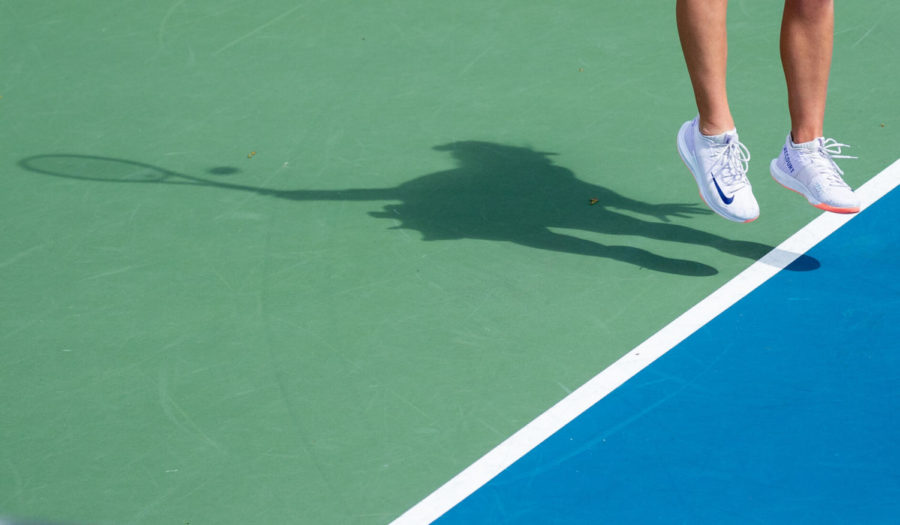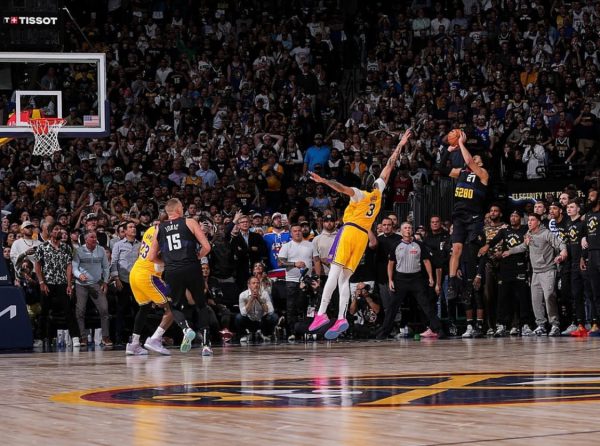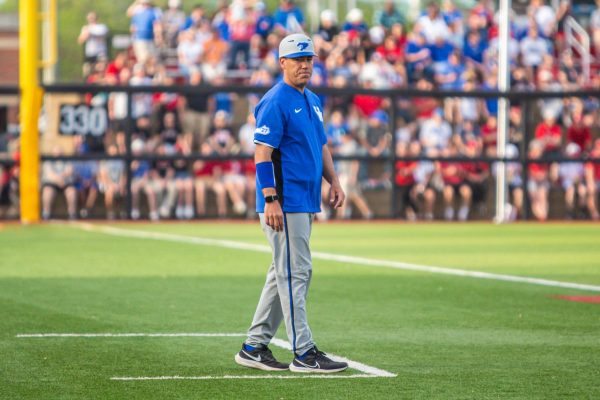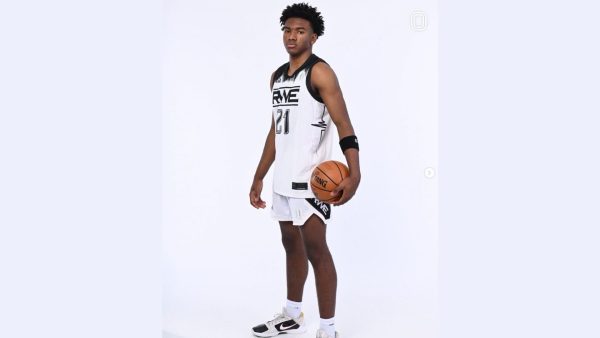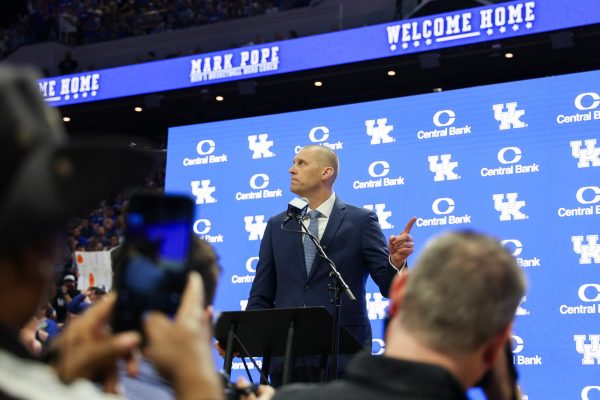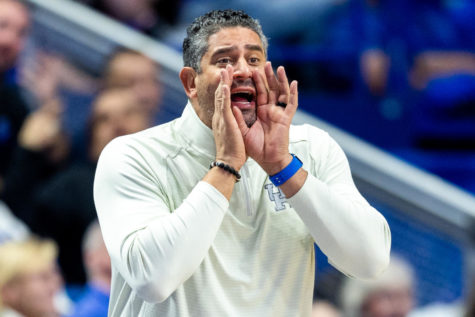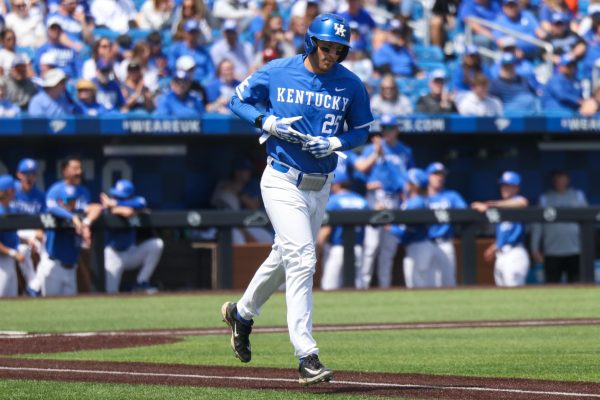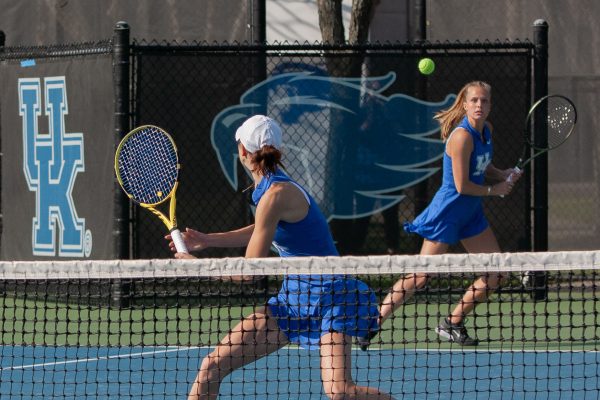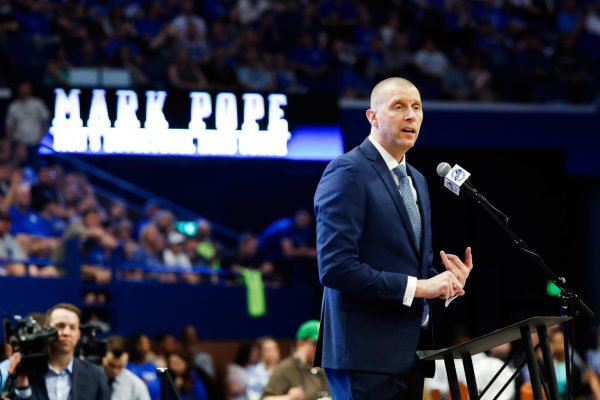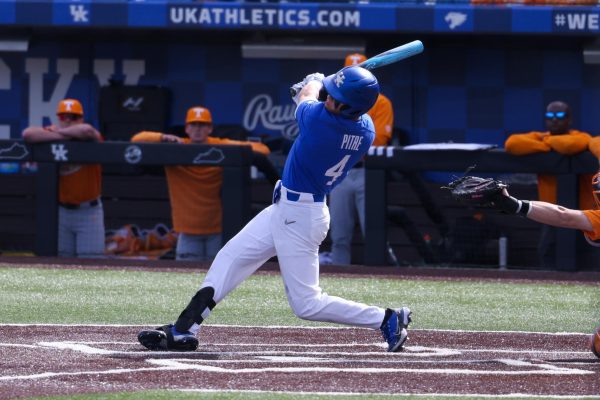Column: Novak Djokovic’s visa mix-up proves fatal amidst vaccine exemption
Akvilė Paražinskaitė serves the ball during the University of Kentucky vs. Tennessee women’s tennis match on Sunday, March 28, 2021, at Hillary J. Boone Tennis Center in Lexington, Kentucky. Photo by Michael Clubb | Staff
January 6, 2022
Novak Djokovic, the current No. 1 ranked tennis player in the world, is a winner of 20 Grand Slam singles titles, including nine Australian Open titles.
On Wednesday, Jan. 5, the Serbian landed in Australia, preparing to defend his 2021 Aussie Open title, with the 2022 tournament set to begin on Jan. 17. However, Djokovic’s chances to defend his title took a swift turn, as the country denied him entry and canceled his visa due to failing to meet the requirements for an exemption to the COVID-19 vaccination rules.
Djokovic announced on social media Tuesday that he had received a medical exemption from the Victoria state government. The Australian Open had announced that all participants in the tournament must be vaccinated or be granted a medical exemption by an independent panel of experts. A statement was released confirming that Djokovic’s exemption was granted, and he was allowed to compete in Australia.
Djokovic was one of just a “handful” of granted exemptions, according to Craig Tiley, Australian Open tournament director.
Despite this, Djokovic’s exemption was not accepted by border authorities, citing that he failed to meet entry requirements.
“Mr. Djokovic’s visa has been cancelled. Rules are rules, especially when it comes to our borders. No one is above these rules,” Scott Morrison, Prime Minister of Australia said in a statement.
Health Minister Greg Hunt said that the cancellation of Djokovic’s visa came following a review of his exemption by border officials who looked at “the integrity and the evidence behind it.”
Prior to the decision to cancel his visa, Djokovic was being held at the airport in Melbourne, according to Australian news outlets. It was later reported that the visa Djokovic applied for did not permit medical exemptions for being unvaccinated against COVID-19.
Djokovic is set to appeal in court to attempt to avoid imminent deportation and to compete in the 2022 Australian Open.
On one hand, Djokovic was granted a medical exemption to compete in the tournament, clearing him for action in Australia. On the other hand, there was a mix–up in visas, leaving a country’s border forced to do their job. Where does the grey area lie?
Immediate backlash was received once it was announced that Djokovic would be allowed to compete in the tournament. Australia has been among the strictest in the battle against Covid-19, extending lockdowns, closing borders for extended periods of time and enforcing quarantine upon arrival into the country.
The Open was criticized for allowing exemptions, with some finding it coincidental that Djokovic, a nine-time champion of the event, was one of the handful to receive a pass.
James Merlino, Victoria state Deputy Premier called the exemptions a “loophole for privileged tennis players.”
Though Tiley called the exemption process “completely legitimate,” it is easy to build speculation that Merlino’s remarks may hold some ground.
Djokovic is no stranger to having his name in headlines surrounding vaccinations and medicine, either. The Serbian has expressed his opposition to vaccine mandates on multiple occasions. Until this week, Djokovic had not previously released whether he was vaccinated or not. Djokovic even tested positive for the virus in June 2020.
The life of a professional tennis player is one that requires serious travel on a consistent basis. The four Grand Slams, the biggest tournaments in the sport, all take place in different countries: Australia, France, England and the USA.
While the COVID-19 protocols may vary in each country, there is one connector amongst them all, the push for vaccination. The decision to not be vaccinated leads to a bundle of requirements that must be met on a country-to-country basis to access each individual place.
Two other tennis players, Tennys Sandgren and Pierre-Hugues Herbert, who both are also unvaccinated, decided against playing in the Australian Open once there was a vaccination requirement by the tournament. Djokovic attempted to have it both ways, slipped up, and now finds himself amidst a national media storm surrounding mandates, vaccines, and rules.
A nationwide requirement was made. An exemption to the requirement was granted. The proper documentation needed to affirm the exemption was unable to be brought forward, resulting in the termination of the exemption.
While it feels as though a double standard was met at the expense of one of the all-time great tennis players, rules were made, and they should not be broken for anyone because of stipulations.
As COVID-19 holds a lasting effect on the landscape of the world, a reliance on medical exemptions will only prove to be temporary. It is more than possible that other countries hosting tournaments on tour will require the same regulations as Australia. Djokovic’s fight could just be beginning.
The French Open, Wimbledon and the U.S. Open are all yet to announce whether vaccinations will be mandatory for their tournaments.












































































































































